Looking for a new heating system for your home? Hydro-air heating systems may be the perfect choice for you! In this blog post, we will discuss everything you need to know about these systems – from how they work to the benefits they offer. Read on to learn more!
How Hydro-Air Heating Works
Hydro-air heating systems use water to transfer heat to your home. A boiler heats water and sends it through a series of pipes and into radiators throughout your home. The water in the radiators then transfers its heat to the air, which is circulated by a fan.
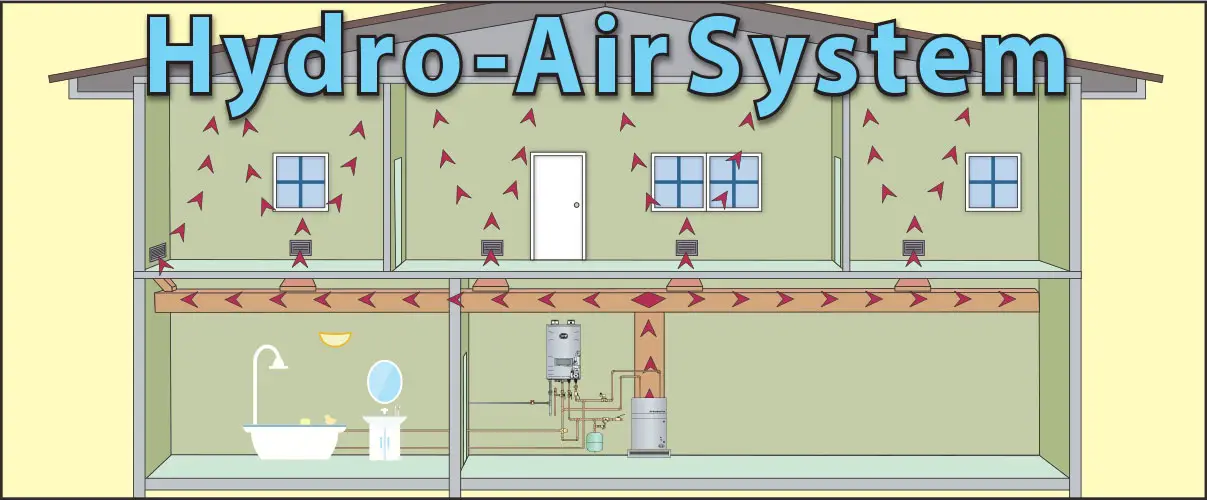
Hydro-air systems can be used for both heating and cooling your home. In the summer, the system can be used for air conditioning by running cold water through the pipes.
There are a few things to keep in mind if you’re considering a hydro-air system for your home. First, because they use water, they require regular maintenance to prevent rust and corrosion. Second, they can be more expensive to install than other types of heating and cooling systems.
The Advantages of Heating with Hydro-Air
Flexibility and Zoning Options
One of the great advantages of heating with a hydro-air system is the flexibility it offers in terms of zoning options. You can heat different areas of your home independently, which means you can save energy by only heating the areas that you are using. Hydro-Air systems also offer greater comfort than other types of heating systems because they provide consistent temperatures throughout the house. There are no hot or cold spots, so you and your family will always be comfortable. [2]
Warm Floors
Another advantage of hydro-air heating is that it provides warm floors. This can be a great benefit in the winter when you don’t want to step out of bed onto cold floorboards. With a hydro-air system, your floors will always be warm, no matter how cold it is outside.
Lower Energy Bills
Hydro-air systems are also very efficient, which means they can help you save money on your energy bills. Because they provide consistent temperatures and don’t have hot or cold spots, you won’t have to waste energy by constantly adjusting your thermostat.
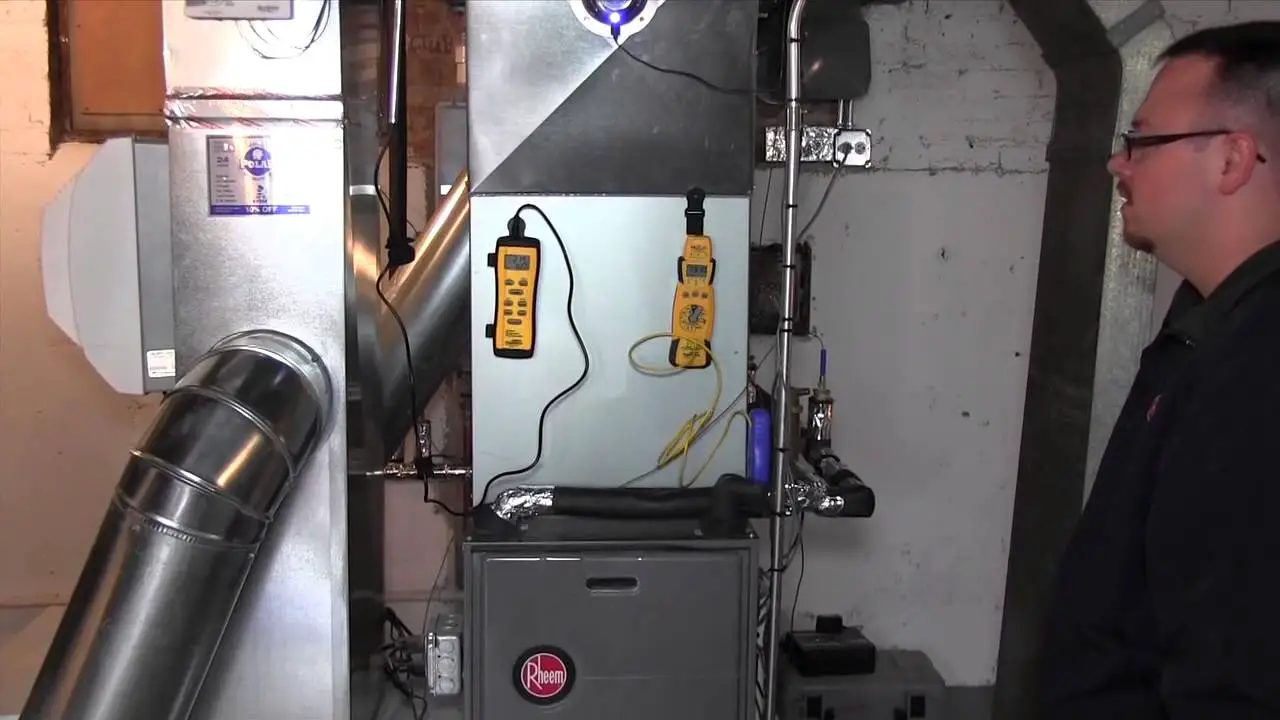
Quiet Operation
Finally, hydro-air systems are very quiet. You won’t even know they’re running most of the time, which is a stark contrast to other types of heating systems that can be quite loud. If you want a heating system that will provide warmth and comfort without any noise, then a hydro-air system is the perfect choice.
No Ducts Required
One of the best things about hydro-air systems is that they don’t require any ductwork. This can save you a lot of money on installation, as well as make it easier to retrofit your existing home with this type of heating. If you’re looking for a more efficient and flexible way to heat your home, then a hydro-air system is definitely worth considering.
Humidity Levels
One thing to keep in mind with hydro-air systems is that they can affect the humidity levels in your home. This is because the system uses water to transfer heat, which can add moisture to the air.
Reliability
Another thing to consider is the reliability of hydro-air systems. Because they don’t have any ductwork, there are fewer moving parts that can break down. This means that hydro-air systems are typically very reliable and require little maintenance.
Cost
Finally, you should also consider the cost of a hydro-air system. These systems can be more expensive to install than other types of heating systems, but they often pay for themselves in energy savings over time. If you’re looking for a long-term solution to your heating needs, then a hydro-air system may be the right choice for you.
The Disadvantages of Hydro-Air Heating Systems
There are a few disadvantages of hydro-air heating systems that you should be aware of. One is that they can be more expensive to install than other types of heating systems.
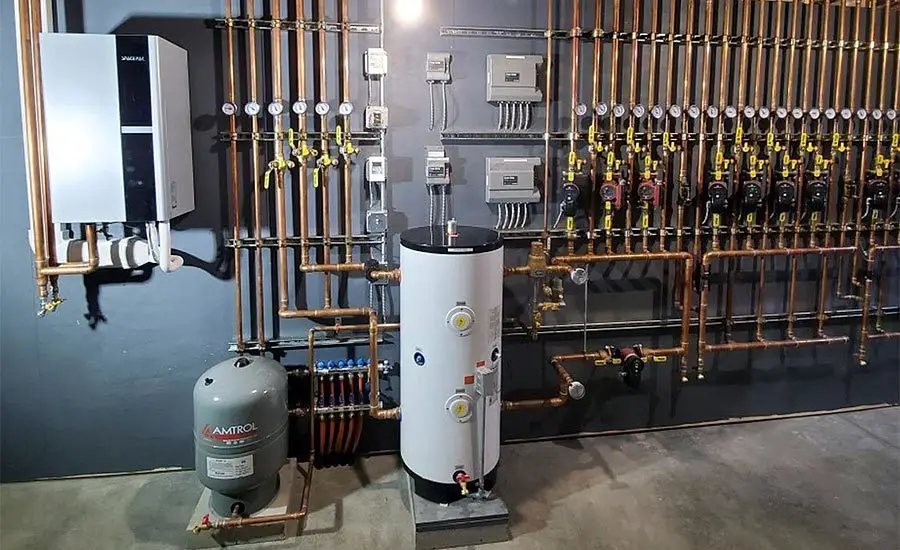
Additionally, they require more maintenance than other types of heating systems and can be noisy.
Finally, if there is a problem with the system, it can be difficult to diagnose and repair.
However, despite these potential drawbacks, hydro-air heating systems offer many advantages that may make them the best choice for your home.
Types of Hydronic Radiant Heating Systems
There are three types of hydronic radiant heating systems – floor systems, panel radiators, and baseboard convectors.
Floor Systems: Floor hydronic radiant heating systems are usually installed in new homes during construction. The system consists of a network of tubing installed in the floor joists beneath the finished floor. Hot water circulates through the tubing, warming the floor above it. [3]
Panel Radiators: Panel radiators look like large, flat picture frames that can be hung on walls or placed on the floor. They work by circulating hot water through finned tubing mounted inside the frame. The heat is then transferred to the air around the radiator by convection.
Baseboard Convectors: Baseboard convectors are similar to panel radiators, but they are usually smaller and designed to be mounted on the floor next to baseboards. Like panel radiators, they work by circulating hot water through finned tubing. The heat is carried from the engine to the ambient air by convection.
What to Consider When Buying Hydro Air Systems?
There are a few key things to keep in mind when you’re shopping for hydro air systems. First, you’ll want to make sure that the system is properly sized for your home. This means that it should be able to heat all of the rooms in your house evenly and efficiently.
Secondly, you’ll want to pay attention to the quality of the components. Make sure that the system you choose has high-quality parts that will last for years to come.
Finally, consider the cost of installation and maintenance when making your decision. Hydro air systems can be a great investment, but only if they’re installed and maintained properly.
Tips On Hydro-Air Heating Systems: How To Save Money
If you’re looking for a way to save money on your heating bill, then you should consider investing in a hydro-air heating system. Hydro-air systems are very efficient and can save you up to 30% on your energy costs. Here are some tips on how to get the most out of your hydro-air system:
Make sure that your home is well insulated. This will help to keep the heat in and the cold out. You can also add weather stripping around doors and windows to further improve energy efficiency.
Invest in a good quality thermostat. A programmable thermostat will allow you to set different temperatures for different times of the day, so you’re not wasting energy when you’re not home.
Following these tips can help you save money on your energy bill and keep your home comfortable all winter long. If you have any questions about hydro-air systems, please feel free to contact us.
How Long Do Hydro Air Systems Last?
The average lifespan of a hydro-air system is around 20 years. However, with proper maintenance, your system can last much longer. Regular tune-ups are important to keep your system running efficiently and to prevent costly repairs down the road. [4]
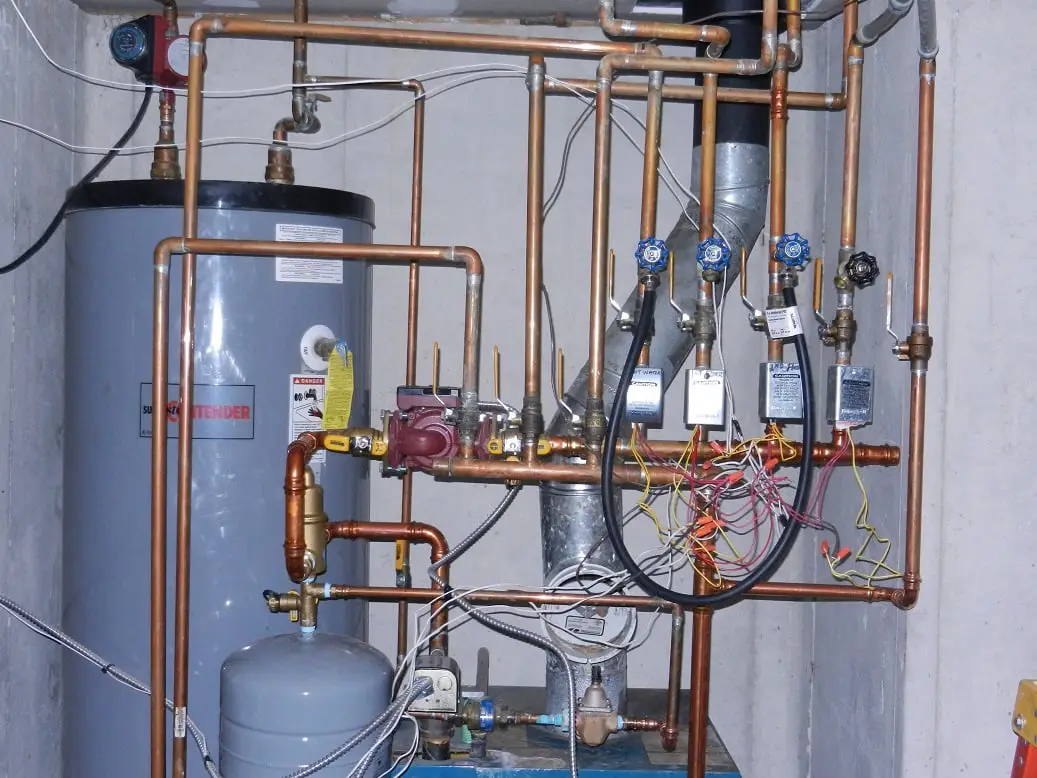
How Much Does An Air Handler Cost?
The cost of an air handler will vary depending on the size and features you need. A small, basic model may start around $500, while a larger, more complex system can cost upwards of $2000.
Does the Hydro-Air Heating System Dry the Air?
No, a hydro-air heating system does not dry the air. The humidity levels in your home will remain the same as they were before you installed the system. However, you may notice that the air feels cooler when the system is first turned on. This is because the air is being circulated more frequently and is therefore losing some of its heat. After a short while, the air will warm up and feel just like it did before. [5]
What About Allergies?
If you suffer from allergies, you may be wondering if a hydro-air heating system is right for you. The good news is that these systems can actually help to improve indoor air quality by circulating fresh, clean air throughout your home. This can help to reduce the amount of allergens and other pollutants that are circulating in your home.
Is It Worth Buying?
If you’re considering a hydro-air heating system for your home, it’s important to know all of the pros and cons before making a decision. Here’s everything you need to know about hydro-air systems, so you can decide if they’re the right choice for you.
FAQ
How does Hydro air heat work?
Hydro-air heating systems work by using a boiler to heat water. The hot water is then sent through pipes to air handlers. The air handlers have coils that the hot water passes through.
What are some benefits of Hydro-air heating?
There are several benefits of hydro-air heating systems including:
- Efficient – Hydro-air systems are very efficient because they use a boiler to heat water which is then used to heat your home. Boilers are much more efficient than furnaces because they don’t have to heat up as much space.
- Quiet – Hydro-air systems are also very quiet because the boiler is located outside of your home.
- Flexible – Hydro-air systems are very flexible because they can be used with a variety of different ductwork systems.
- Safe – Hydro-air systems are safe because they don’t use any combustion to heat your home. This means that there is no risk of carbon monoxide poisoning.
What are some drawbacks of Hydro-air heating?
There are a few drawbacks to hydro-air heating including:
- Cost – Hydro-air systems can be expensive to install because they require both a boiler and an air handler.
- Maintenance – Hydro-air systems require regular maintenance in order to keep them running efficiently.
- Repair – If something goes wrong with your hydro-air system, it can be expensive to repair.
How do I know if Hydro-air heating is right for me?
If you are looking for an efficient and quiet way to heat your home, then hydro-air heating might be right for you. However, if you are on a budget, then hydro-air heating might not be the best option. You should also keep in mind that hydro-air systems require regular maintenance and can be expensive to repair if something goes wrong. Talk to a professional before making a decision to see if hydro-air heating is right for your home.
What is the best way to maintain my Hydro air system?
The best way to maintain your hydro-air system is to have it serviced by a professional on a yearly basis. This will ensure that your system is running efficiently and that any potential problems are caught early. You should also make sure to keep the area around your boiler clean and free of debris.
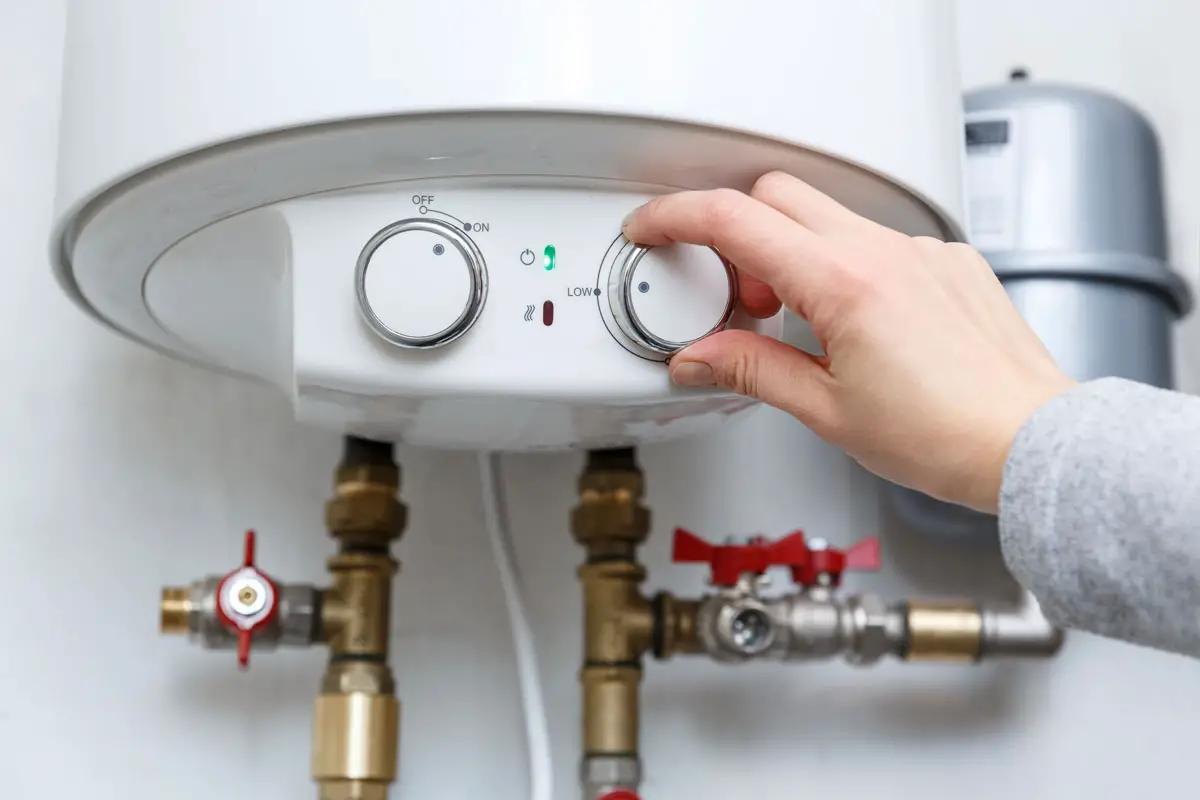
Is hydro air heating efficient?
The short answer is yes, hydro air heating is an efficient way to heat your home. Hydro air systems use a water heater to heat the water that circulates through the system. This means that you are only heating the water that you need, when you need it, making it a very efficient system.
How much does a hydro air system cost?
The cost of a hydro air system will vary depending on the size and complexity of the system.
What is the most efficient hydronic heating system?
There is no definitive answer to this question as there are a number of factors that need to be considered when determining the most efficient hydronic heating system. However, some general tips include:- ensuring that your system is properly insulated- using a heat pump in conjunction with your hydronic system- using an indirect fired water heater for domestic hot water production- sizing your system correctly for your needs.
Does hydronic heat add humidity?
Yes, hydronic heat can add humidity to your home. This is because the water vapor that is produced by the heating process can condense on surfaces in your home, which can lead to increased levels of humidity.
How do I prevent my hydronic heating system from freezing?
There are a number of ways that you can prevent your hydronic heating system from freezing. Some of these include:- ensuring that your system is properly insulated- using a heat pump in conjunction with your hydronic system- using an indirect fired water heater for domestic hot water production- sizing your system correctly for your needs.
How do I know if my hydronic heating system is working properly?
There are a few things that you can look for to determine if your hydronic heating system is working properly. These include:- feeling warmth coming from the floor or radiators- seeing steam or water vapor coming from the floor or radiators- hearing a hissing sound coming from the floor or radiators.If you notice any of these things, then it is likely that your hydronic heating system is not working properly and you should contact a qualified technician for assistance.
How often should I have my hydronic heating system serviced?
It is generally recommended that you have your hydronic heating system serviced at least once per year by a qualified technician. This will help to ensure that your system is operating efficiently and safely.
What are some common problems with hydronic heating systems?
Some common problems with hydronic heating systems include:
- leaks in the system
- insufficient insulation
- incorrect sizing of the system
- improper installation of the system.
If you experience any of these problems, then you should contact a qualified technician for assistance.
What temperature is hydronic heat?
Hydronic heating systems can operate at a range of temperatures, but most commonly operate between 120 and 180 degrees Fahrenheit. The temperature that your system runs at will be determined by a variety of factors, including the climate you live in, the type of fuel you’re using, and the size and layout of your home.
Does hydronic heating dry the air?
No, it actually humidifies the air as it heats it. This is due to the fact that water vapor is released into the air as the water in the system warms up. This can be beneficial for people who suffer from respiratory problems or allergies since humid air is easier to breathe than dry air. It can also help prevent static electricity shocks since humid air does not conduct electricity as well as dry air. Overall, hydro-air systems provide many benefits and are a great option for those looking for an alternative to traditional forced-air heating systems.
Useful Video: How tankless hydronic forced-air heating works
Conclusion
Now that you know everything there is to know about hydro-air heating systems, you can make an informed decision about whether or not this type of system is right for your home. If you have any further questions, be sure to consult with a qualified HVAC contractor. They will be able to help you choose the best option for your specific needs and ensure that your new system is installed correctly.
Hydro-air heating systems are a great way to heat your home efficiently and effectively. With a little bit of research, you can find the perfect system for your needs and ensure that your home is comfortable all winter long. Stay warm!
References
- https://boucherenergy.com/products/hydro-air-systems/
- https://www.homereference.net/hydro-air-heating/
- https://www.newhomesource.com/learn/radiant-floor-heating-in-new-homes/
- https://www.achrnews.com/articles/140416-hvac-system-life-cycles-how-long-should-they-really-last
- https://www.huntheat.com.au/blog/why-hydronic-heating-is-better-for-your-health/










Leave a Reply